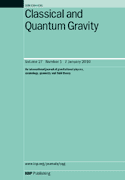
CLASSICAL AND QUANTUM GRAVITY
metrics 2024
Advancing Theories in Classical and Quantum Realms
Introduction
CLASSICAL AND QUANTUM GRAVITY is a prestigious journal published by IOP Publishing Ltd, positioning itself at the forefront of research in the domain of theoretical physics, particularly focusing on gravitational theories in both classical and quantum frameworks. With an impressive Q1 rank in the field of Physics and Astronomy, it has established a significant academic presence since its inception in 1984. This journal offers a platform for disseminating high-quality research findings and critical reviews, playing a pivotal role in advancing our understanding of the foundations of gravitational physics. Researchers and professionals alike will find this scholarly publication an invaluable resource for staying abreast of the latest developments in gravitational theory, quantum gravity, and related interdisciplinary studies. Despite the absence of open access options, its vibrant print and online presence ensures that contributions are accessible to the global scientific community. With a commitment to fostering innovation in an area that remains central to modern physics, CLASSICAL AND QUANTUM GRAVITY continues to attract cutting-edge research that shapes the future of gravitational studies.
Metrics 2024
 1.23
1.23 3.60
3.60 3.30
3.30 188
188Metrics History
Rank 2024
Scopus
IF (Web Of Science)
JCI (Web Of Science)
Quartile History
Similar Journals

Journal of High Energy Astrophysics
Exploring the Cosmos: Unraveling High-Energy MysteriesThe Journal of High Energy Astrophysics, published by Elsevier, is a premier platform for groundbreaking research in the fields of astrophysics and high-energy phenomena. With an ISSN of 2214-4048 and an E-ISSN of 2214-4056, this journal has quickly established itself as a leader since its inception in 2014. Operating out of the Netherlands, it is recognized for its rigorous peer-review process and high-quality publications, earning an impressive Q1 ranking across multiple domains, including Astronomy and Astrophysics, Nuclear and High Energy Physics, and Space and Planetary Science in 2023. With a Scopus rank of 12 out of 90 in the Astronomy and Astrophysics category, and being positioned in the 87th percentile, the journal plays a pivotal role in disseminating advancements and fostering collaboration among researchers, professionals, and students. Though the journal is not open access, it offers robust subscription options for institutions and individuals seeking to dive into the latest discoveries and theories in high-energy astrophysics.
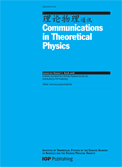
COMMUNICATIONS IN THEORETICAL PHYSICS
Elevating theoretical discourse to new heights.COMMUNICATIONS IN THEORETICAL PHYSICS is a distinguished journal published by IOP Publishing Ltd, focusing on the broad and evolving field of theoretical physics. With an ISSN of 0253-6102 and an E-ISSN of 1572-9494, this journal provides a platform for the dissemination of innovative research that contributes to the understanding of complex physical concepts. Situated in the United Kingdom, it has established itself as a pivotal resource from 1996 to 2024, achieving a commendable Q2 ranking in the category of Physics and Astronomy (miscellaneous) for 2023. With a Scopus ranking of #18 out of 81 in its category, demonstrating a 78th percentile, this journal plays a crucial role in enhancing scholarly communication among researchers, professionals, and students alike. Although it does not currently offer Open Access options, the journal's comprehensive scope and commitment to high-quality peer-reviewed research underline its significance in the scientific community, making it an essential reading for anyone engaged in theoretical physics.

Living Reviews in Relativity
Advancing the Frontiers of Relativity ResearchLiving Reviews in Relativity, published by SPRINGER INT PUBL AG, stands at the forefront of the field of relativity, offering a dynamic platform for the dissemination of high-quality, peer-reviewed research. Since its inception in 1998, this Open Access journal has committed to providing continuous updates and comprehensive reviews, making it an indispensable resource for researchers and scholars in the categories of Physics and Astronomy, where it holds a prestigious Q1 ranking. With its impressive Scopus ranking of #1 out of 81 in the Physics and Astronomy (miscellaneous) category, it boasts a remarkable 99th percentile ranking, underscoring its significance in advancing scientific discourse. Operating out of Switzerland, Living Reviews in Relativity serves as a vital conduit for sharing knowledge and insights, fostering collaborative research, and promoting timeless discussions in the ever-evolving landscape of relativistic physics.

PHYSICAL REVIEW LETTERS
Connecting Researchers with Cutting-Edge DiscoveriesPhysical Review Letters, published by the American Physical Society, is a premier journal in the field of Physics and Astronomy renowned for its rapid dissemination of high-impact research findings. With a distinguished history dating back to 1958 and an impressive ranking of #13 out of 243 in the general physics category, it stands proudly within the Q1 quartile, placing it in the top 6% of journals in its field. The journal focuses on brief reports of significant fundamental research across all areas of physics, making it an essential resource for researchers, professionals, and students seeking to stay at the forefront of developments in their field. Although Physical Review Letters does not offer open access options, its rigorous peer-review process ensures a high standard of quality and relevance in its published articles. With an unwavering commitment to advancing the understanding of physical science, this journal is indispensable for those looking to make a genuine impact in their research endeavors.

Physics of the Dark Universe
Transforming Perspectives on Dark Cosmic PhenomenaPhysics of the Dark Universe is a premier academic journal published by Elsevier, dedicated to advancing the understanding of dark matter, dark energy, and their implications for the universe. With its ISSN N/A and E-ISSN 2212-6864, the journal has established a notable presence since its inception in 2012, operating out of Amsterdam, Netherlands. As evidenced by its impressive impact factor and its ranking in the top quartile in both Astronomy and Astrophysics (Q1) and Space and Planetary Science (Q1) categories for 2023, this journal is a vital resource for researchers and practitioners within these fields. In the latest Scopus ranks, it ranks #12 out of 104 in Earth and Planetary Sciences and #13 out of 90 in Physics and Astronomy, placing it in the 88th and 86th percentiles respectively, underlining its academic significance. The journal is not Open Access, yet it plays an essential role in disseminating high-quality research that pushes the boundaries of knowledge about the cosmos and its most enigmatic components. Researchers, professionals, and students interested in the forefront of astrophysics will find this journal an indispensable tool for staying abreast of emerging discoveries and ongoing debates.
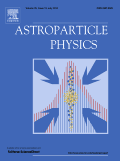
ASTROPARTICLE PHYSICS
Pioneering Research in the Realm of Astroparticle PhenomenaASTROPARTICLE PHYSICS is a premier international journal dedicated to advancing the understanding of the intersection between particle physics, astronomy, and astrophysics. Published by Elsevier, this journal has established itself as a leading source of research insights since its inception in 1992, with a remarkable impact factor positioning it within the Q1 category for Astronomy and Astrophysics for 2023. With a Scopus ranking of 18 out of 90 in its field, representing the top 80th percentile, ASTROPARTICLE PHYSICS serves as an essential platform for disseminating groundbreaking research that influences astrophysical studies and cosmological theories. Researchers and academics have access to a robust collection of peer-reviewed articles that explore various dimensions of astroparticle phenomena, collaborative cosmic investigations, and theoretical advancements. Although not an open-access journal, it provides extensive research coverage accessible to a global audience from its headquarters in Amsterdam, Netherlands, offering a vital resource for those seeking to push the boundaries of knowledge in the realms of astrophysics and particle physics.
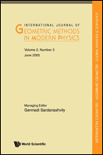
INTERNATIONAL JOURNAL OF GEOMETRIC METHODS IN MODERN PHYSICS
Unraveling Modern Physics with Geometric PrecisionINTERNATIONAL JOURNAL OF GEOMETRIC METHODS IN MODERN PHYSICS is a leading academic publication dedicated to the interdisciplinary exploration of geometric methods in the realms of modern physics. Published by WORLD SCIENTIFIC PUBL CO PTE LTD, this esteemed journal is based in Singapore and acts as a critical platform for researchers, professionals, and students seeking to delve into the intricacies of modern theoretical physics and its geometric foundations. With an impressive Scopus ranking placing it in the 64th percentile of its category, the journal highlights innovative research and developments from 2005 to 2024 within its scope. While currently not offering Open Access, it remains a vital resource for the dissemination of valuable knowledge in its field, contributing significantly to the advancement of physics and astronomy. We encourage the academic community to explore this exceptional journal for cutting-edge insights and to further enhance their understanding of geometric applications in modern scientific inquiry.

Universe
Fostering Collaboration in the Realm of Astrophysics.Universe is a distinguished peer-reviewed journal published by MDPI, specializing in the dynamic fields of Physics and Astronomy. Established in 2015, this Open Access journal has rapidly gained recognition, achieving a prestigious Q1 quartile ranking in its category as of 2023. With its E-ISSN 2218-1997, the journal primarily serves the international scientific community, offering a platform for researchers to disseminate innovative ideas and findings. Based in Switzerland, Universe covers a wide range of topics within astronomy and astrophysics, ensuring that cutting-edge research is accessible to an ever-growing audience. Its commitment to open access principles since its inception allows for unrestricted dissemination of knowledge, fostering a collaborative environment essential for scientific advancement. By aligning its objectives with the promotion of high-quality research and interdisciplinary discourse, Universe stands as a vital resource for academics, professionals, and students aiming to contribute to and engage with the ever-evolving landscape of astronomical research.

EUROPEAN PHYSICAL JOURNAL C
Unlocking Innovative Discoveries in Particle PhysicsEUROPEAN PHYSICAL JOURNAL C (EPJ C), published by SPRINGER, stands as a premier platform for innovative research in the domains of Physics and Engineering. With its Open Access policy established in 2014, EPJ C ensures that groundbreaking findings are readily available to the global scientific community, enhancing accessibility and collaboration. The journal, indexed in prestigious databases, boasts an impressive impact factor and ranks within the Q1 category for both Engineering and Physics and Astronomy, placing it among the top-tier journals in these fields. Celebrated for its rigorous peer-review process, EPJ C offers a wide-ranging scope encompassing various topics in particle physics, quantum field theory, and related interdisciplinary studies. Its consistent publication since 1991 has fostered a vibrant community of researchers dedicated to advancing knowledge and innovation in physics and engineering. Join the scholarly discussion and contribute to the cutting-edge research made possible through EPJ C's esteemed platform.
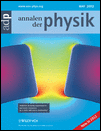
ANNALEN DER PHYSIK
Advancing Knowledge in Physics and BeyondANNALEN DER PHYSIK, a prestigious journal published by WILEY-V C H VERLAG GMBH, stands as a cornerstone of the field of physics and astronomy since its inception in 1799. With an ISSN of 0003-3804 and an E-ISSN of 1521-3889, this journal provides a platform for innovative research and critical discourse across various domains of physics. Annalen der Physik is currently ranked in the Q2 category for general physics and astronomy, occupying rank #76 out of 243 in Scopus, placing it within the 68th percentile. This indicates its significant impact and the quality of research it publishes. Although the journal does not offer Open Access options, its robust historical lineage and ongoing contributions ensure that it continues to be an essential resource for researchers, professionals, and students alike. For those seeking to stay at the forefront of contemporary physics research, ANNALEN DER PHYSIK represents a vital source of knowledge, innovation, and scholarly communication.